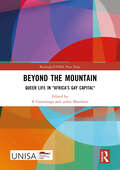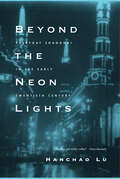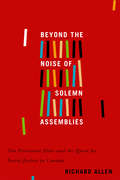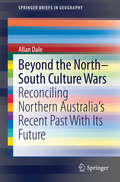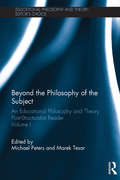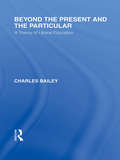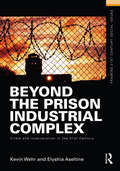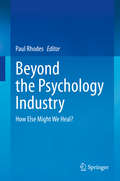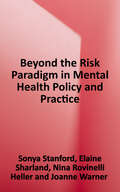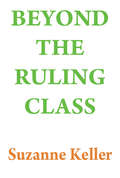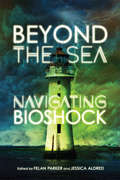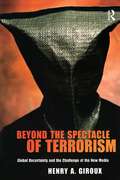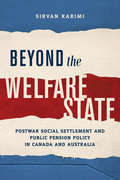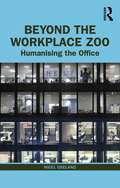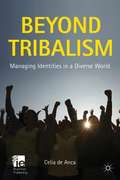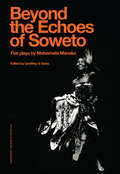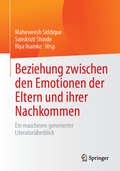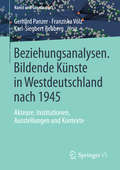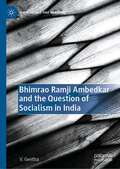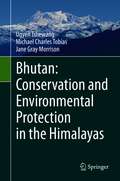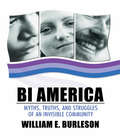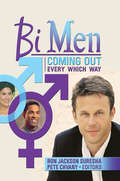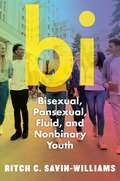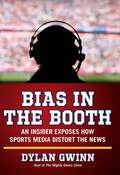- Table View
- List View
Beyond the Mountain: Queer Life in "Africa’s Gay Capital" (Routledge/UNISA Press Series)
by B Camminga Zethu MatebeniBeyond The Mountain: Queer Life in "Africa’s Gay Capital" contributes to the body of knowledge on the lived experiences of lesbian, gay, bisexual, transgender, queer, and intersex (LGBTQI) communities in Cape Town. The book provides insight on the lives of the LGBTQI communities in Cape Town and challenges the stereotypes and prejudices against these communities. The chapters consist of both narratives of lived experiences and academic discussions presented by novice as well as experienced scholars. The imagery of beyond the mountain is a depiction of the lives of LGBTQI community and immovable negative perceptions the general public have to them and seeks to expose their world and the kinds of violence and abuse they are subjected to, as well as unveiling the racial discrimination within these communities. The book revolves around five themes: education, emancipation, protection, acceptance, and integration of those who identify as LGBTQI people in society.
Beyond the Neon Lights: Everyday Shanghai in the Early Twentieth Century
by Hanchao LuHow did ordinary people live through the extraordinary changes that have swept across modern China? How did peasants transform themselves into urbanites? How did the citizens of Shanghai cope with the epic upheavals—revolution, war, and again revolution—that shook their lives? Even after decades of scholarship devoted to modern Chinese history, our understanding of the daily lives of the common people of China remains sketchy and incomplete. In this carefully researched study, Hanchao Lu weaves rich documentary data with ethnographic surveys and interviews to reconstruct the fabric of everyday life in China's largest and most complex city in the first half of this century.
Beyond the Noise of Solemn Assemblies: The Protestant Ethic and the Quest for Social Justice in Canada (McGill-Queen's Studies in the History of Religion #82)
by Richard AllenSince the 1970s Richard Allen's scholarship on the social gospel has broken new ground in the field of Canadian social and religious history by recovering key aspects of the tradition and its contribution to reform movements and politics. Beyond the Noise of Solemn Assemblies collects and extends many of his classic works to present a comprehensive overview of a major thread in the fabric of the country. Observing the mutual foundations of political and religious traditions in myth and arguing that the sacred and the secular belong together in discussions of public affairs, Allen contests the view that religion is personal and isolated from the public square. He discusses a range of topics: the transition from providential to progressive thought in nineteenth-century Canada; the new spirituality of social solidarity articulated by Winnipeg college students in the 1890s; the role of the social gospel in pioneering urban reform; farmers and workers finding in radical Christianity legitimation for political revolt; Christian intellectuals in the 1930s framing a revolutionary prospectus for Depression-era Canada; the significance of Norman Bethune's religious upbringing for his life and work; strategically focused post-war ecumenical coalitions like Project North and the Latin American Working Group; and the prospects for democratic socialism at the end of the Cold War. Opening with a chapter relating the author's upbringing in a ministerial household dedicated to the Protestant ethic as the spirit of socialism, Beyond the Noise of Solemn Assemblies represents a significant contribution to understanding the social Christian movement in Canada.
Beyond the North-South Culture Wars: Reconciling Northern Australia's Recent Past With Its Future (SpringerBriefs in Geography)
by Allan DaleIncreasingly, Australia's agriculturalists are looking to the nation's north to escape the decline in southern Australia's water and soil resources. Booming mineral and gas development is also helping to drive the nation's economic success. At the same time, the south's conservation sector would like to see much of the north preserved as iconic wilderness. Both conservation and resource development interests alike are often at odds with the interests of the north's traditional owners, many of whom remain trapped in welfare dependency and poverty. Indeed, to the ire of north Australians, the past five decades of north Australian history have indeed been characterized by these national-scale conflicts being played out in regional and local communities. This book explores these conflicts as well as the many emerging opportunities facing the development of the north, suggesting that a strong cultural divide between northern and southern Australia exists; one that needs to be reconciled if the nation as a whole is to benefit from northern development. The author first explores where these historical conflicts could take us without a clear forward agenda. A story-based personal narrative from his long and diverse experience in the north gives life to these themes. Finally, the book then draws on these stories to help shape a cohesive agenda for the north's future.
Beyond the Philosophy of the Subject: An Educational Philosophy and Theory Post-Structuralist Reader, Volume I (Educational Philosophy and Theory: Editor’s Choice)
by Michael A Peters Marek TesarThis first volume focuses on a collection of texts from the latter twenty years of Educational Philosophy and Theory, selected for their critical status as turning points or important awakenings in post-structural theory. In the last twenty years, the applications of the postmodern and poststructuralist perspectives have become less mono-focused, less narrowly concerned with technical questions and also less interested in epistemology, and more interested in ethics. This book covers questions of genealogy, ontology, the body and the institution, giving examples of theoretical applications of post-structural theory that testify to the generative and endlessly applicable potential of this work to different fields and avenues of thought. While informed by Foucault's thinking of the political subjugation of docile bodies to individuals as self-determining beings, the chapters in this book culminate in amalgamations of different schools of educational philosophy, which explore poststructuralist approaches to education. Beyond the Philosophy of the Subject will be key reading for academics, researchers and postgraduate students in the fields of philosophy of education, philosophy, education, educational theory, post-structural theory, the policy and politics of education, and the pedagogy of education.
Beyond the Present and the Particular (International Library of the Philosophy of Education Volume 2): A Theory of Liberal Education
by Charles H. BaileyCharles Bailey advances a modern characterization and justification of liberal education and defends such a view of liberal education against contemporary challenges. The book will be of special value to those guiding educational policy, designing curricula and reflecting on their own teaching practice. An introductory part of the book describes the need for justification and the special nature of liberal education as compared with other characterizations of education in utilitarian terms. The author offers a positive account of the content of liberal education, after a consideration and critique of the work of Paul Hirst, Philip Phenix and John White and follows this with an account of teacher strategy, attitude and methodology appropriate to liberal education. The final part of the book describes contemporary trends and challenges to the idea of liberal education and shows how they fail to provide a coherent alternative to liberal education as a basis for universal compulsory education.
Beyond the Prison Industrial Complex: Crime and Incarceration in the 21st Century (Framing 21st Century Social Issues)
by Kevin Wehr Elyshia AseltineThis short text, ideal for Social Problems and Criminal Justice courses, examines the American prison system, its conditions, and its impact on society. Wehr and Aseltine define the prison industrial complex and explain how the current prison system is a contemporary social problem. They conclude by using California as a case study, and propose alternatives and alterations to the prison system.
Beyond the Psychology Industry: How Else Might We Heal?
by Paul RhodesThis book provides a scholarly yet accessible approach to critical psychology, specifically discussing therapeutic practices that are possible outside of the mainstream psychology industry. While there are many books that deconstruct or dismantle clinical psychology, few provide a compendium of potential alternatives to mainstream practice. Focusing on five main themes in reference to this objective: suffering, decolonization, dialogue, feminism and the arts, these pages explore types of personal inquiry, cultural knowledge or community action that might help explain and heal psychological pain beyond the confines of the therapy room. Chapters focus on the role of cultural knowledge, including spiritual traditions, relational being, art, poetry, feminism and indigenous systems in promoting healing and on community-based-initiatives, including open dialogue, justice-based collaboration and social prescribing. Beyond the Psychology Industry will be of interest to researchers, clinical psychologists, therapists, academics in mental health, and cultural psychologists.
Beyond the Risk Paradigm in Mental Health Policy and Practice
by Sonya Stanford Elaine Sharland Nina Rovinelli Heller Joanne WarnerModern society is increasingly preoccupied with fears for the future and the idea of preventing 'the worst'. The result is a focus on attempting to calculate the probabilities of adverse events occurring - in other words, on measuring risk. Since the 1990s, the idea of risk has come to dominate policy and practice in mental health across the USA, Australasia and Europe. In this timely new text, a group of international experts examines the ways in which the narrow focus on specific kinds of risk, such as violence towards others, perpetuates the social disadvantages experienced by mental health service users whilst, at the same time, ignoring the vast array of risks experienced by the service users themselves. Benefitting from the authors' extensive practice experience, the book considers how the dominance of the risk paradigm generates dilemmas for mental health organizations, as well as within leadership and direct practice roles, and offers practical resolutions to these dilemmas that both satisfy professional ethics and improve the experience of the service user. Combining examination of key theories and concepts with insights from front-line practice, this latest addition to Palgrave's Beyond the Risk Paradigm series provides an important new dimension to debates on mental health provision.
Beyond the Ruling Class: Strategic Elites in Modern Society
by Suzanne KellerInfluential minorities have existed in some form in all human societies. Throughout history, such elites have evoked varied responses--respeet. hos-tility, fear. envy, imitation, but never indifference. While certain elite groups have been of only passing historical importance, strategic elites, whose mem-bers are national and international leaders, today are ultimately responsible for the realization of social goals and for the continuity of the social order in a swiftly changing world. This volume, which first appeared in 1963, markeda major advance in our theoretical understanding of these elites, why they are needed, how they operate, and what effect they have on society. Drawing upon the work of such classical writers as Saint-Simon. Marx. Durkheim. Mosca. Pareto. and Michels, and such modern scholars as Mann-heim. Lasswell, Aron. Mills, and Parsons, the author presents a challenging theory of elites that provides the framework for her examination of their co-existence, their social origins, and their rise and decline. The elites discussed here include political, diplomatic, economic, and military, as well as scientific, cultural, and religious ones. Systematically, the author surveys available em-pirical data concerning American society, and selected materials on Great Brit-ain. Germany, the Soviet Union, and the developing nations of Asia and Africa. Written with clarity and distinction. Beyond the Ruling Class remains a thorough and provocative treatment, rich in empirical insights, of a subject that will compel the attention of political scientists, sociologists, and historians concerned with themes of power, influence, and leadership in national and international life. Her new introduction to Beyond the Ruling Class is at once an appraisal of the current status of elite studies and a careful self-evaluation of her efforts.
Beyond the Sea: Navigating Bioshock
by Felan Parker Jessica AldredThe Bioshock series looms large in the industry and culture of video games for its ambitious incorporation of high-minded philosophical questions and retro-futuristic aesthetics into the ultraviolent first-person shooter genre. Beyond the Sea marks ten years since the release of the original game with an interdisciplinary collection of essays on Bioshock, Bioshock 2, and Bioshock Infinite. <p><p> Simultaneously lauded as landmarks in the artistic growth of the medium and criticized for their compromised vision and politics, the Bioshock games have been the subject of significant scholarly and critical discussion. Moving past well-trodden debates, Beyond the Sea broadens the conversation by putting video games in dialogue with a diverse range of other disciplines and cultural forms, from parenting psychology to post-humanism, from Thomas Pynchon to German expressionist cinema. <p> Offering bold new perspectives on a canonical series, Beyond the Sea is a timely contribution to our understanding of the aesthetics, the industry, and the culture of video games. <p> Contributors include Daniel Ante-Contreras (Miracosta), Luke Arnott (Western Ontario), Betsy Brey (Waterloo), Patrick Brown (Iowa), Michael Fuchs (Graz), Jamie Henthorn (Catawba), Brendan Keogh (Queensland), Cameron Kunzelman (Georgia), Cody Mejeur (Michigan State), Matthew Thomas Payne (Notre Dame), Gareth Schott (Waikato), Karen Schrier (Marist), Sarah Stang (York/Ryerson), Sarah Thorne (Carleton), John Vanderhoef (California State, Dominguez Hills), Matthew Wysocki (Flagler), Jordan R. Youngblood (Eastern Connecticut State), and Sarah Zaidan (Emerson).
Beyond the Spectacle of Terrorism: Global Uncertainty and the Challenge of the New Media
by Henry A. Giroux"Henry Giroux's essay awakens us to the ways new media proliferate and circulate images and ideas of terror that order our lives, pervert our pedagogy, delimit our democracy. Recommended reading for anyone who wants to comprehend our times, our politics, our possibilities." --David Theo Goldberg, University of California, Irvine "Henry Giroux is one of the sharpest cultural critics today. His new book is an important intervention on media and spectacles. It shows us the depth of the dark side, only to conclude that the same media may be deployed in recovery against the social fragmentation caused by fear and consumerism, which is essential to bringing the country back to the path of decency and justice." --Arif Dirlik, University of Oregon Prominent social critic Henry Giroux explores how new forms of media are challenging the very nature of politics in his most poignant and striking book to date. The emergence of the spectacle of terror as a new form of politics raises important questions about how fear and anxiety can be marketed, how terrorism can be used to recruit people in support of authoritarian causes, and how the spectacle of terrorism works in an age of injustices, deep insecurities, disembodied social relations, fragmented communities, and a growing militarization of everyday life. At the same time, the new media such as the Internet, digital camcorders, and cell phones can be used to energize sites of resistance, provide alternative public spheres, pluralize political struggles, and expand rather than close down democratic relations. Giroux considers what conditions and changes are necessary to reinvigorate democracy in light of these new challenges. Radical Imagination Series
Beyond the Welfare State: Postwar Social Settlement and Public Pension Policy in Canada and Australia
by Sirvan KarimiNeoliberal calls for welfare state reforms, especially cuts to public pensions, are a contentious issue for employees, employers, and national governments across the western world. But what are the underlying factors that have shaped the response to these pressures in Canada and Australia? In Beyond the Welfare State, Sirvan Karimi utilizes a synthesis of Marxian class analysis and the power resources model to provide an analytical foundation for the divergent pattern of public pension systems in Canada and Australia. Karimi reveals that the postwar social contract in Australia was market-based and more conducive to the privatization of retirement income. In Canada, the social contract emphasized income redistribution that resulted in strengthening the link between the state and the citizen. By shedding light on the impact of national settings on public pension systems, Beyond the Welfare State introduces new conceptual tools to aid our understanding of the welfare state at a time when it is increasingly under threat.
Beyond the Workplace Zoo: Humanising the Office
by Nigel OselandThis book begins by outlining the common design mistakes with the modern open plan office and the industry focus on cost that has resulted in the ill-fated Workplace Zoo. The requirements of office-based workers according to psychological theory and research are then explained. Dr Oseland references historical studies in psychophysics to describe how to design environmental conditions (acoustics, lighting, temperature, indoor air quality) that enhance performance by supporting basic physiological needs. More contemporary research in environmental psychology investigates how cognition affects our interpretation and response to physical stimuli depending on personality, context, attitude and other personal factors. This in turn informs individual requirements for the environmental conditions as well as group needs. Studies in evolutionary psychology and biophilia are also referenced. The latter part of the book turns to workplace solutions and focuses on how to plan, design and manage offices to accommodate our innate human needs now and in the future. The importance of designing for inclusivity is also recognised, including accommodating cultural, gender and generational differences along with designing spaces for neurodiversity. Dr Oseland’s proposed workplace solution the Landscaped Office is a revived and revised version of Bürolandschaft with a contemporary twist. The impact of workplace trends, such as agile working and hot-desking, is also explored and found to complement the workplace solution, resulting in the Agile Landscaped Office. This book is key reading for professionals, and post-graduate students, in business, interior design, architecture, surveying, facilities management, building services engineering, HR and organisational or environmental psychology.
Beyond tribalism
by Celia De AncaIn the past, neo-tribalism in a Western context has been feared as leading to blindness or irrationality. In today's business world, tribalism represents a conscious separation of the individual ego for the good of the community. This is the key to understanding the success of the most innovative businesses in the 21st century.
Beyound The Echoes Of Soweto
by Geoffrey V. Davis; John KaniThis book provides the reader with a comprehensive view of Matsemela Manaka's plays, namely, Egoli, Pula, Children of Asazi, Toro, and Goree and discusses three of his essays: 'Theatre of the dispossessed', 'The Babalaz people', and 'Theatre as a physical word'.
Beziehung zwischen den Emotionen der Eltern und ihrer Nachkommen: Ein maschinen-generierter Literaturüberblick
by Maheweesh Siddique Sanskruti Shinde Riya InamkeDieses Buch zeigt in drei Hauptthemenblöcken mit speziell zusammengestellten Forschungsartikeln auf, wie sich die Emotionen von Eltern oder engen Familienmitgliedern auf ihre Kinder auswirken. Da Eltern die wichtigste Rolle im Leben ihrer Kinder spielen, ist es von Vorteil, die Beziehung zwischen ihren Emotionen und deren Auswirkungen auf den Nachwuchs zu verstehen. Eltern können die Art und Weise, wie ihre Kinder ihre Emotionen regulieren, über drei Kanäle beeinflussen: das emotionale Klima im Elternhaus, emotionsbezogene Erziehungspraktiken und die kindliche Beobachtung der Emotionsregulation ihrer Eltern. Die elterlichen Emotionen haben also einen wesentlich größeren Einfluss auf die Entwicklung des Kindes als Erwachsener, als oft angenommen wird. Das Buch enthält einen systematischen Literaturüberblick auf der Grundlage maschinell generierter Inhalte. Fragen und zugehörige Schlüsselwörter wurden für die Maschine vorbereitet, die sie abgefragt, entdeckt, zusammengestellt und durch Clustering mit künstlicher Intelligenz (KI) strukturiert hat. Springer Nature hat in den letzten Jahren viel zu dem Thema in Zeitschriften veröffentlicht, so dass die Herausforderung für die Maschine darin bestand, die relevantesten Inhalte zu identifizieren und sie in einer strukturierten Weise zu präsentieren. Die automatisch generierten Literaturzusammenfassungen dienen Fachkräften aus den Bereichen Psychologie und Erziehung, aber auch Wissenschaftler:innen und Studierenden dazu, sich schnell einen Überblick über die aktuelle Entwicklung des Themas zu verschaffen. Sie sollen außerdem als Anregung und Impuls für aktuelle Forschungsfragen, für neue Strategien sowie für mögliche Lösungen in schwierigen Situationen nützlich sein.
Beziehungsanalysen. Bildende Künste in Westdeutschland nach 1945: Akteure, Institutionen, Ausstellungen und Kontexte (Kunst und Gesellschaft)
by Gerhard Panzer Franziska Völz Karl-Siegbert RehbergAb den fünfziger Jahren entstand in Westdeutschland mit der neu geschaffenen ,,documenta" allmählich das Bild einer eigenständigen ,,Westkunst". Unter neuen politischen Rahmenbedingungen bewegte sich die Kunstwelt zwischen Versuchen, an Vorkriegstraditionen anzuknüpfen und sich zu modernisieren. Es kanonisierten sich abstrakte Gegenwartstendenzen, welche in der Gegensatzspannung zum Osten zunehmend politisch instrumentalisiert wurden. Von den Zeitgenossen schon kontrovers diskutiert, wird diese Phase der Kunstentwicklung bis heute unterschiedlich bewertet. Der vorliegende Band versammelt historisch-empirische Analysen, die die Beziehungsgeflechte in der damaligen Kunstwelt und deren strukturbildende, dynamische Vernetzung mit der Gesellschaft untersuchen, wobei die sozialen Träger dieser Erfolgsgeschichte im Mittelpunkt stehen.
Bhartiya Samajatil Sanskrutik Prashna Six Semester TYBA New NEP Syllabus - RTMNU: भारतीय समाजातील सांस्कृतिक प्रश्न सहावे सत्र टी.वाय.बी.ए. नवीन एन.इ.पी. अभ्यासक्रम - राष्ट्रसंत तुकडोजी महाराज नागपूर विद्यापीठ
by Dr Rahul Bhagat Dr Nalini Borkar'भारतीय समाजातील सांस्कृतिक प्रश्न' हे पुस्तक डॉ. राहुल भगत आणि डॉ. नलिनी बोरकर यांचे महत्त्वपूर्ण संशोधनपर कार्य असून, समाजशास्त्राच्या अभ्यासक्रमानुसार भारतीय समाजातील सांस्कृतिक विविधतेचा व्यापक आढावा घेते. या ग्रंथात बहुसांस्कृतिकता, लिंग आणि पितृसत्ता, माध्यमे व जागतिकीकरण, तसेच सांस्कृतिक संघर्ष यांसारख्या मुद्द्यांचा सखोल अभ्यास केला आहे. भारतीय समाजाची वैशिष्ट्ये म्हणजे अनेक धर्म, जाती, भाषा, आणि प्रांतांची एकत्रित सहअस्तित्वाची संस्कृती. पुस्तकात विविध अन्न, पोशाख, सण, प्रथा-परंपरा, आणि धार्मिक आचार यांच्यातील विविधता स्पष्ट करून, त्यातून उद्भवणाऱ्या संघर्षांचा मागोवा घेतला आहे. विशेषतः आस्तिकता-नास्तिकता, जातिविरोधी पंथ, नारायण गुरु व पेरियार यांचे कार्य, आणि बौद्ध धर्माचे महत्त्व यावर विस्तृत चर्चा आहे. पितृसत्ताक रचनेतील स्त्रियांची स्थिती, LGBTQ+ च्या समस्या, आणि स्त्री हक्क यावर सुद्धा पुस्तक सखोल विचार मांडते. जागतिकीकरणामुळे भारतीय संस्कृतीवर झालेले परिणाम, पाश्चिमात्यीकरण, सांस्कृतिक संकरीकरण, आणि स्थानिकतेचे महत्त्व हे भागही महत्त्वाचे आहेत. सांस्कृतिक संघर्षांच्या मुळाशी असलेल्या जातीय, धार्मिक, वांशिक, व प्रादेशिक संघर्षांवरही या पुस्तकात चर्चा आहे. बहुसंख्याक आणि अल्पसंख्याक संस्कृतीमधील अंतर, आदिवासी संस्कृतीचे संरक्षण, आणि भारतातील सांस्कृतिक परिवर्तनाची प्रक्रिया अत्यंत सुबोध पद्धतीने मांडण्यात आली आहे. एकूणच, हे पुस्तक भारतीय समाजातील सांस्कृतिक गुंतागुंतीचे वास्तव आणि त्यातील समस्यांचा अभ्यासू दृष्टिकोनातून वेध घेते.
Bhimrao Ramji Ambedkar and the Question of Socialism in India (Marx, Engels, and Marxisms)
by V. GeethaThis book offers a reading of Bhimrao Ambedkar’s engagement with the idea and practice of socialism in India by linking it to his lifelong political and philosophical concerns: the annihilation of the caste system, untouchability and the moral and philosophical systems that justify either. Rather than view his ideas through a socialist lens, the author suggests that it is important to measure the validity of socialist thought and practice in the Indian context, through his critique of the social totality. The book argues its case by presenting a broad and connected overview of his thought world and the global and local influences that shaped it. The themes that are taken up for discussion include: his understanding of the colonial rule and the colonial state; history and progress; nationalism and the questions he posed the socialists; his radical critique of the caste system and Brahmancal philosophies, and his unusual interpretation of Buddhism.
Bhutan: Conservation and Environmental Protection in the Himalayas
by Michael Charles Tobias Jane Gray Morrison Ugyen TshewangLocated in the heart of the Eastern Himalayas, Bhutan practices the philosophy of Gross National Happiness (“GNH”) that embraces environmental conservation as one of the main building blocks for its sustainable development goals. Bhutan’s conservation strategies and success are largely driven by the strong political will and visionary leadership of His Majesty the King of Bhutan The nation’s Buddhist perspectives regarding a deep and abiding respect for nature; and the strategic enforcement of a wide-ranging stringent set of internal regulations and controls have helped ensure ecological gold standards in Bhutan. Moreover, the country is an active member of the international conservation community by fulfilling its implementation of various Multilateral Environment Agreements. While it emerged into the 21st century as one of the 36 global terrestrial “hotspots” in biological diversity conservation ranks, Bhutan’s sheer commitment with more than 51% of its territory being managed under the explicit status of a protected area network, and more than 70% of the land under forest cover, represents Bhutan’s exemplary dedication to protect the planet despite its smallness in size and economy, and the biological fragility exemplified by its hotspot situation. In the face of imminent severe threats of global warming, Bhutan nonetheless exemplifies the truth that “a small country with a big conservation commitment” can make an enormous contribution to the global community.At the regional level, Bhutan is intent upon protecting the Water Towers of Asia (that glacial expanse of the Himalayas) which is a critical resource bulwark for about one-fifth of the global population downstream in South Asia. Such protections invariably help mitigate climate change by acting as a nation-wide carbon sink through its carbon neutral policies. In short, Bhutan has long represented one of the world’s foremost national guardians of biodiversity conservation, ecological good governance, and societal sustainability at a period when the world has entered the Anthropocene – an epoch of mass extinctions.We envision this publication to be ecologically and ethically provocative and revealing for the concerned scientific communities, and governments. Through an extensive review of the scientific and anthropological literature, as well as the research team's own data, the Author's have set forth timely recommendations for conservation policies, strategies and actions. This book provides technical and deeply considered assessments of the state of Bhutan’s environment, its multiple, human-induced stressors and pressures; as well as extremely sound, practical techniques that would address conservation strategies in the Himalayas and, by implication, worldwide.
Bi America: Myths, Truths, and Struggles of an Invisible Community
by William BurlesonGain an in-depth understanding of the unique struggles of the bisexual community! "To me the gay and straight worlds are exactly the same; equally limited, judgmental, and bourgeois . . . just mirror images of each other. I truly like and overlap with some of the gay world, but my roots refuse to take hold there and grow. Unfortunately, my well-established roots in the straight world are simultaneously shriveling and dying too, leaving me feeling extremely unstable." -"Cool," a bisexual woman involved in a support groupThere are at least five million bisexual people in America, generally invisible to straight society, the gay community, and even to each other. While the vast majority of these five million live within the straight or gay world, there are a few who have formed a community of their own. Bi America: Myths, Truths, and Struggles of an Invisible Community offers an inside look at the American bisexual community and gives an understanding of the special circumstances unique to being bisexual. The book takes the reader to bi community events from picnics, to conferences, to support groups, to performances in order to expose the everyday trials of the bisexual community.Bi America includes very personal stories that let the voice of everyday bisexuals be heard through interviews, the "Bisexual History Project," in which ten bisexual people tell their life stories, and the "Online Support Group," a group of about 75 people who meet in cyberspace to talk about their lives and challenges. The book also includes the findings of a 2002 survey of about 300 bisexual people conducted via the Internet, an appendix that offers a concise list of resources for further study and personal enrichment, and an unabridged transcript of the "Bisexual History Project."Get the answers to these questions in Bi America: What is bisexuality? Is there a bisexual community? What is the culture of the bisexual community? What are commonalities and differences between the experiences of bi men and bi women? What is the special relationship between the bisexual and the transgender community? How have bisexuals and the bi community been affected by HIV/AIDS? What is the future of bisexual activism, if any? and many more! Bi America is a fascinating resource that exposes the challenges, struggles, and triumphs of bisexuals in America. Bisexuals, especially those newly coming out, can use this book to help understand their identity, and family members and friends seeking some insight into the unique circumstances faced by their loved ones will also find it helpful. This book will interest those concerned with the sociology of deviance or with subcultures in general. It is also appropriate for undergraduate sociology and cultural anthropology, as well as feminist studies and LGBT studies classes. This book offers one of the few accessible, nonacademic looks at this unique and interesting community. Visit the book's Web site at http://www.bi101.org
Bi Men: Coming Out Every Which Way
by Ron Jackson Suresha Pete ChvanyA moving and pioneering celebration of the male bisexual self that addresses biphobia in our societyIn today&’s sexual world, both straight and gay and lesbian communities still often refuse to accept the reality of bisexuality. Bi Men: Coming Out Every Which Way confronts head-on the limiting views that bisexuality is a transitional phase of sexual evolution or a simple refusal to accept being either homosexual or straight. This pioneering collection of moving personal essays by bisexual men and those who love them explores what it means to be bisexual in today&’s monosexually oriented society.The millennial shift in sexual perspectives draws more and more men to come out as being attracted to both women and men. Bisexual and bi-curious men will find comfort and camaraderie in these stories about coming out, its impact on family and marriage, evolving perspectives on bisexuals within the LGBT community, and the building of acceptance and affirmation for bisexuality and polyamory. The nearly three dozen essays in Bi Men: Coming Out Every Which Way are told in the honest words of bisexuals, confirming the validity of their place in the world while illustrating that there are more bi men than anyone ever realized. These diverse and pioneering men&’s stories reveal a long-disguised and unconventional truth-that bisexuality is a valid lifestyle that does not threaten either sexual camp. Each contributor to this collection affirms the innate fluidity of self, sexuality, family, and community, and proclaims that sexuality is truly diverse in its predispositions and creativity.Bi Men: Coming Out Every Which Way separates its essays into four parts: coming out and personal realization of bisexual nature bisexuality&’s effects on family and marriage an examination of the shifting viewpoints of bisexuality within gay communities ways in which bisexuals can affirm and respect their own desires and celebrate their sexual selvesThese intimate stories address: biphobia monosexual prejudice the impact on marriage family issues coming out to self, spouse, and family political and community issues religious and spiritual concernsBi Men: Coming Out Every Which Way is a vibrant, reassuring call to bisexuals, the bi-curious, or anybody who knows and loves a bisexual/bi-curious man, to read and more completely understand the unique issues of being bisexual while providing the ultimate affirmation of bisexuality&’s existence.
Bi: Bisexual, Pansexual, Fluid, and Nonbinary Youth
by Ritch C. Savin-WilliamsWhat bisexual youth can tell us about today’s gender and sexual identities Despite the increasing visibility of LGBTQ people in American culture, our understanding of bisexuality remains superficial, at best. Yet, five times as many people identify as bisexual than as gay or lesbian, and as much as 25 percent of the population is estimated to be bisexual. In Bi, noted scholar of youth sexuality, Ritch Savin-Williams, brings bisexuality to centerstage at a moment when Gen Z and millennial youth and young adults are increasingly rejecting traditional labels altogether. Drawing on interviews with bisexual youth from a range of racial, ethnic, and social class groups, he reveals to us how bisexuals define their own sexual orientation and experiences—in their own words. Savin-Williams shows how and why people might identify as bisexual as a result of their biology or upbringing; as a bridge or transition to something else; as a consequence of their curiosity; or for a range of other equally valid reasons.With an understanding that sexuality and romantic attachments are often influx, Savin-Williams offers us a way to think about bisexuality as part of a continuum. He shows that many of the young people who identify as bisexual often defy traditional views, dispute false notions, and reimagine sexuality with regard to both practice and identity. Broadly speaking, he shows that many young people experience a complex, nuanced existence with multiple sexual and romantic attractions as well as gender expressions, which are seldom static but fluctuate over their lives.Savin-Williams provides an important new understanding of bisexuality as an orientation, behavior, and identity. Bi shows us that bisexuality is seen and embraced as a valid sexual identity more than ever before, giving us timely and much-needed insight into the complex, fascinating experiences of bisexual youth themselves.
Bias in the Booth: An Insider Exposes How the Sports Media Distort the News
by Dylan GwinnMost of us see sports as a welcome--even blessed--relief from the challenges and frustrations of everyday life. We want to sit back, open a beer, and enjoy the game. But many of those who bring us the game have a different agenda--they use their broadcasting platform to harangue us with their own politically correct preoccupations. If a seventh-round NFL draft pick who can't make the team or an over-the-hill basketball player declares that he's gay, he gets wall-to-wall media coverage and is hailed as a hero. If a stripper accuses college lacrosse players of rape, liberal sports reporters lead the lynch mob--with no apologies when the bearers of "white privilege" are proved innocent. In his blistering new book Bias in the Booth, sports reporter and commentator Dylan Gwinn takes you inside the sports media spin machine to reveal what they hope you won't notice: the sports media are no different from the news and entertainment media.
